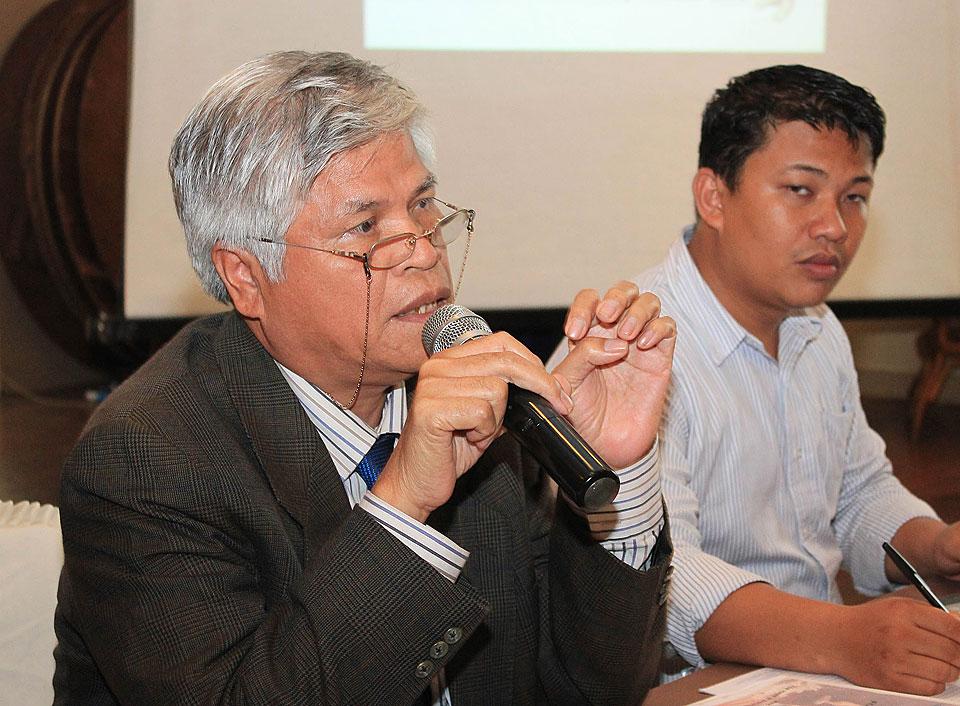LWF Christian-Muslim Consultation Outlines Strategies for Democratic Economic Structures

Rev. Nelson Siregar, head of the diakonia department of the Protestant Christian Batak Church in Indonesia addresses the LWF consultation. © LWF/Anto Akkara
Faith Communities Urged to Learn from Social Movements Clamoring for Change
The Lutheran World Federation (LWF) continues a series of interfaith consultations on structural greed, this time with a goal to defining common strategies by Christians and Muslims in ensuring equitable and just sharing of economic resources.
More than 40 delegates including scholars, community leaders, justice activists and economists from India, Indonesia, Malaysia, Namibia, the Netherlands and the United States, attended the conference in Medan, under the theme, “Toward a Democratic Polity and the Common Good.”
“Let faith bear fruit through democracy,” said Bishop Langsung Maruli Sitorus, chairperson of the LWF National Committee in Indonesia, as he opened the meeting jointly hosted by the 12 Lutheran churches in the country and the Muhammadiyah University of Yogyakarta. He noted that the “aim of faiths (religions) is not merely to promote harmony in society. We have to convert tolerance into love for others and translate it into the good of the society.”
The consultation is organized by the LWF Department for Theology and Public Witness (DTPW) to underscore the contention that true democracy recognizes the need for just economic structures, which both Muslim and Christian teaching embraces.
“Christians and Muslims need to identify the ways in which, based on their respective traditions, certain structures can be developed so that wealth can be shared among all,” a DTPW paper for the event states.
Sarwo Edi, chief of the Muhammadiyah Council of Medan, noted that interfaith dialogue should benefit local people. “We hope this conference will be fruitful in finding new ways to help the communities,” he said.
Rev. Dr Martin Sinaga, LWF study secretary for Theology and the Church, explained the consultation is part of LWF’s efforts “to have socially engaged interfaith dialogue to deepen and reclaim democracy for the common good.”
He added: “The pro-democracy movement in the Arab world is heartening. The fact that people are supporting democracy shows that they want changes for the good of the society.” With this goal in mind, the conference is scrutinizing the grass root-level experiences of democracy and preparing the way for a “just society that enables the people to share common wealth.”
Delivering the keynote address, Prof. Katimin of the Institute of Islamic Studies at Medan, called for religions’ engagement in society for the common good of all people.
“The challenge before us is to apply democracy to deal with people’s problems,” said Rahmawati Husein, assistant professor of government studies at Muhammadiyah University of Yogyakarta. “Religions have to develop an action plan within the democratic structures for the good of the society,” added Husein, former vice president of the university women’s youth wing.
Speakers also urged faith communities to learn from people’s movements such as the ‘Arab Spring’ in North Africa and the Middle East, seeking political changes; and the Narmada Bachao Andolan movement in India fighting against the construction of dams across the Narmada River, the subcontinent’s fifth largest river. Similarly, it was pointed out that during the Christian-Muslim clashes in Indonesia in 1997-1998, women from both communities joined hands to provide relief and shelter to affected people, ignoring taunts from religious leaders.
Delegates will hear about the positive impact of a basic income grant project in an impoverished community in Namibia, and about micro-credit schemes in Indonesia. A booklet will be published from the consultation outlining how Christians and Muslims can help structure economic governance for the sake of all citizens. (584 words)
(By LWI correspondent Anto Akkara)

